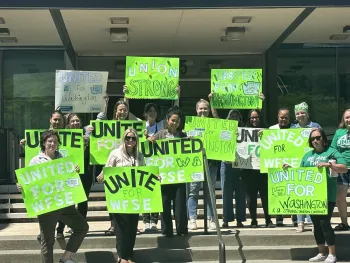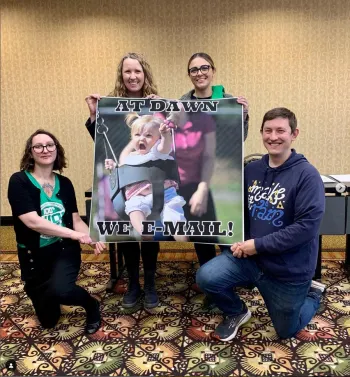Have a Problem?
We work at DCYF! Issues at work come in all varieties. Our union is here to support all of us; this page is meant to guide you to the right resource when you need or want assistance.
Jump to a section of this page:
Where to Start
Office-Wide Issues
Addressing Issues Through Bargaining
How to Create Change: Examples
Where to Start
If you have an issue that is impacting you at work, the first person to talk with is a union steward or a council rep. They are trained in the Collective Bargaining Agreement (CBA), and can help you find answers related to your rights in the workplace. They are also able to represent you in meetings with supervisors and management, and can help you with the grievance process (this happens when your rights are being violated). If you don't know who the steward in your office is, or how to get in touch with them, you can contact the Member Connection Center at 1-833-MCC-WFSE (833-622-9373) or email [email protected] for help right away during business hours. Use your personal phone or email address to do this.
Office-Wide Issues

Is the issue impacting more than just you? If it's office-wide, talk with your steward(s) and Member Action Team about how you can organize your co-workers for change. If it seems like it might be a larger issue or you aren't making any headway with your office, reach out to your Council Representative (you can find them through the Member Connection Center) or local leadership for direction. Depending on the issue, it may be brought up at a Union Management Communication Committee (UMCC) and discussed with management. It could also become a very long email chain, a Demand to Bargain, or take other delightful forms.
If you still haven't been able to address your concern, or you want to discuss it with us, you can reach out to Policy Committee Leadership here: [email protected]
Addressing Issues Through Bargaining
Are you looking for increased salaries, better benefits, or expanded protections for your role? Most of these questions are determined by our CBA (Collective Bargaining Agreement), which is negotiated through the bargaining process. You can learn more about bargaining here. If something is allowed by the CBA, it may not be actionable outside of bargaining (at least practically). But you can always double-check with a steward to ensure that something is allowed, and with your council rep, local leadership, or with us, to see if there is another way to address it.
How to Create Change: Examples
If you want change, you have to identify a way to create that change. You're welcome to reach out to us or to another union leader, but here are a few examples of how you might take the lead on a problem or issue:
1. You think the PEOPLE jacket is ugly, and as a Social Worker you naturally want a stylish union cardigan instead. But you can only trust someone with experience and talent, who is an elected representative of the worker, to design this cardigan. There is clearly only one way to accomplish this: "Knitwear Designer" must become an officer position on our Policy Committee. The officers you contact about this don't recognize your brilliance, so you take the initiative to get it done.

You run for and are elected as a Policy Committee delegate by your local. You speak with a few other delegates and members for feedback and ideas about your cause. You attend a Policy Committee meeting, where you propose the text for an amendment to our bylaws, and at the following meeting you speak for the amendment. It goes to a vote of delegates present, is passed by a 2/3 majority, and the change is later approved by the Council Executive Board. Soon after, the newly elected Knitwear Designer creates a beautiful WFSE cardigan that is truly one for the ages.
If, instead, you complain to your friends that there is no Knitwear Designer, that's valid and understandable. But that doesn't make a Knitwear Designer any closer to reality, unless you inspire one of your friends to take action themselves.
2. You're a clerical supervisor who is frustrated by your region's confusing and contradictory "policy" for using personal cars. You ask your local union leadership to address this, but they're busy building a campaign to get a pay raise for our clerical teams and they have no time for anything else. You ask the Chair of the Policy Committee for help, but she is working on that same campaign, while also participating in bargaining, lobbying a representative, organizing a UMCC, and leading three other union meetings, somehow all at the same time.
You then build up or meet with a Member Action Team in your office, email the Member Connection Center to get in touch with your council rep, and then reach out to your rep to request contact information for involved union members at other offices in your region. You meet with your region-wide team and create a plan to talk with the AAs in each of your offices. The AAs don't have answers, but they ask Management to clarify the policy, putting additional pressure on them to find some responsibility.
Your council rep includes you in your next regional UMCC, where you bring up this issue. Your speaking up in the UMCC combined with the pressure from AAs across the region results in Management committing to send out an email to everyone clarifying the use of personal cars, and they (somewhat surprisingly) do as promised. This either fixes the issue, or you go back to your team to figure out next steps.
3. Take a look at how one group of WFSE members built up a MAT team when they were asked to do work above their job class - without the pay to go with it.

